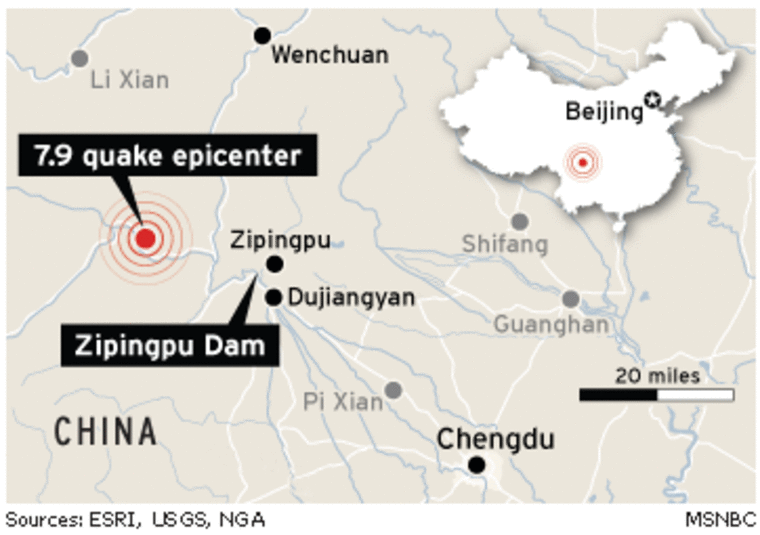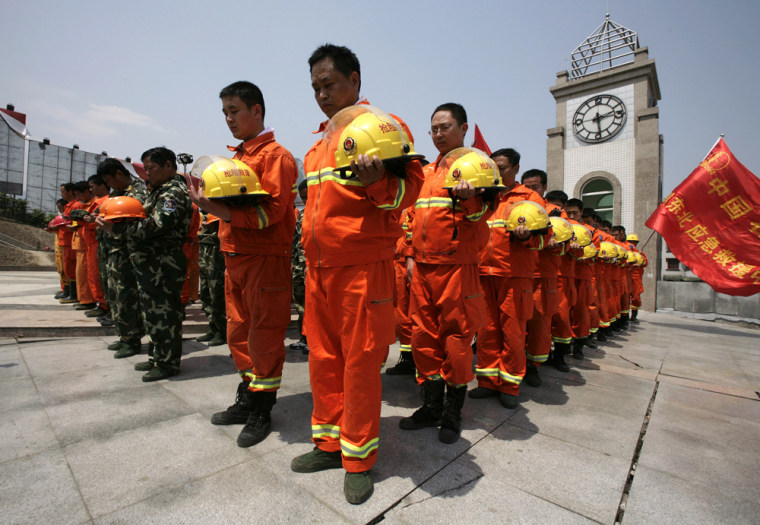A government warning of a major aftershock sent thousands of panicked survivors running into the darkened streets Monday night following an unprecedented display of mourning for more than 34,000 people killed in a powerful earthquake one week ago.
In shattered Sichuan province, quake-weary residents carried pillows, blankets and chairs from homes into the open or slept in cars after a statement from the National Seismology Bureau was read on television warning that there was a "rather great" chance of an aftershock measuring magnitude 6 to 7. Such jolts could cause major damage.
People in the provincial capital of Chengdu got in their cars and drove east — toward plains and away from the quake zone to the northwest. At intersections outside the city, clusters of people slept on bedrolls. Cars were parked along a service road to a highway, their drivers sleeping on the sidewalk.
In Mianyang, closer to the quake zone, a hospital moved patients into the square outside the rail station, setting up beds, medicine trays and tents.
The alarm compounded uneasiness in the region, which has been rumbled by dozens of aftershocks since the May 12 quake, including one on Monday night measured at magnitude 5.2 by the U.S. Geological Survey. No damage or injuries were reported.
Meanwhile, the Chinese state news agency said a man had been rescued after being trapped for nearly 179 hours in a collapsed building near the epicenter of the May 12 quake.
Xinhua News Agency said Tuesday that the 31-year-old man was pulled out of the debris of a flattened power plant. It did not say how seriously he was injured.
The government says the confirmed death toll in the earthquake has risen to 34,073.
National reflection
The alarm came a few hours after China's more than 1 billion people paused for three minutes of mourning — an observance that previously only honored the death of a top Chinese leader.
At 2:28 p.m., the moment the quake hit, wailing air-raid sirens and the blare of horns from cars, ships and trains signaled the start of the commemoration.
From the broad boulevards of Beijing to the shaken streets of Sichuan province, everyone stood still. Traffic halted in cities, soldiers stood at attention, and people bowed their heads in respect for the dead.
President Hu Jintao led senior government figures in a solemn ceremony televised nationally. Rescuers also briefly halted work in the disaster zone, where hope of finding more survivors was all but gone.
The Olympic torch relay, a potent symbol of national pride in the countdown to the Beijing Games, was suspended.
The occasion demonstrated the profound impact of the quake.
China's Cabinet said the confirmed death toll rose to 34,073, although it is expected to climb. Another 5,260 remained buried in Sichuan, the provincial government said. Almost 250,000 are injured.

The three-minute commemoration — part of an official three days of mourning — gave the government a chance to recognize and channel the grief of millions who have watched the disaster play out in unusually free coverage by state media.
Yin Pu, a Beijing psychologist, said the depth of feeling that people expressed Monday was a surprise.
"The only thing that was planned was the time. We could not have imagined that it would be so powerful," said Yin, who is recruiting volunteer counselors to send to the quake zone.
But there were already signs that the unity would be short-lived.
In Xiushui, one of scores of mountain villages in Sichuan province that were cut off for days in the days immediately after the quake, residents were grateful they now had water, food and other supplies. But they complained the response was slow and blamed local officials whom they described as corrupt and indifferent — a common complaint in rural China that has fueled sporadic protests in the past decade.
"During the first three days after the quake, the local government gave us nothing. No water or food," said Yu Jun, a 44-year-old farmer living in a roadside tent. "In the first few days, we had to get our cooking water from an irrigation ditch. You could see little bugs wiggling around in the water. You would get sick if you drank it."
There were other signs of edginess.
In a gymnasium in Mianyang, east of Xiushui, refugees panicked Sunday when health workers arrived wearing masks, setting off fears of an epidemic. Police were sent in to keep tensions from boiling over.
And in Tiananmen Square, the focus of pro-democracy rallies in 1989 that were crushed by the military, a mourning ceremony erupted into a nationalistic rally as about 1,000 people punched the air with their fists and shouted: "Long live China!" The crowd dispersed after about one hour when police told them to move on.
In a sign the government is sensitive to public perceptions of its response to the disaster, the ruling Communist Party's discipline committee said it had reprimanded three local officials in the quake zone for dereliction of duty, the official Xinhua News Agency said.
The party had instructed its officials to stand "at the front line" of the disaster and these three had failed to do so, Xinhua said.
Teams of rescuers still searched debris with their hands and shovels in the hope of finding anyone alive, but their successes were few. Two women were rescued Monday morning from a collapsed building at a mine site, Xinhua reported.
Signaling it wants help to deal with millions of homeless and injured survivors, China said it would accept foreign medical teams and made an international appeal for tents to provide shelter for the coming rainy season.
More than 200 relief workers were buried in the past three days by mudslides while working to repair roads in Sichuan, Xinhua reported. An official confirmed there had been mudslides causing some deaths but said casualties were still being counted.
For some, there was no solace in Monday's ceremonies.
"I can't feel anything. I have no words," said Hu Yongcui, who did not pause in her search for her missing 17-year-old daughter. "I just want to go home. I just want to find my daughter."
